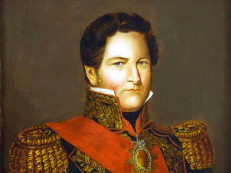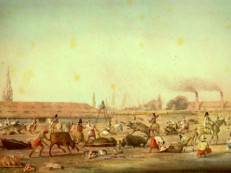This week we are learning about why liberalism never quite thrived in Latin America, and why perhaps liberal ideals were never fully absorbed and integrated into Latin American cultures and societies. As we learnt last week, the Caudillo revolutionaries had ideologically great ideas for the future of Latin America, included in these were: freedom, equality, …
Continue reading “Post-Revolution Latin America: Race and Acceptance In a ‘New’ Society”
Posted in Blogs, Week 6 | Tagged with acceptance, caudillos, colonialism, emancipation, indigenous rights, race, revolution
This week I was particularly interested in the Story of Santa Anna. As I am learning about him in the context of Mexican history, I have noticed how he is presented greatly differs from each source. In the context of Mexican history, Santa Anna is sort of a joke. His eleven sporadic presidencies, often weak and corrupt, portray Mexico as incredibly unstable. He was a president that was only present to achieve military victories; when it came to ruling he was absent, even giving leadership to his vice president while he still held the title of presidency. It seems that he is both so contrary to caudillo culture as he is representative. The idea of a caudillo is that he is a “strongman” who uses force yet exerts the most meticulous and paternal care to the people under his protection. Santa Anna as a leader was far from this, often being removed from office or having little control over Mexico. Yet during battles, he emulates the caudillo, fighting with utmost loyalty to protect his people. It seems that the caudillo is a character of the moment rather than a longterm political figure. This is reaffirmed by the high turnover rate; power imbalances led people to living in a constant state of instability.
The story of the slaughterhouse is a critique of the rampant paternalism within the caudillo system. Yet the language seems paternalistic in itself; Echeverría consistently talks of the mob as uneducated people while using derogatory terms. It seems almost impossible that this would have been an effective tool at garnering support for budding liberalism. I also found it interesting to learn in my other class about how Mexico actually banned slavery early in an attempt to stifle American migration to texas as tensions rose surrounding the border. It seems that the liberalism in this sense was not actually about the rights of citizens but in this case, it was more about political power and action.
I did have quite a few questions about the caudillo system that felt slightly unanswered. I was really wondering how this political system managed to expand over such a large area. It seemed surprising to me that Argentina would be just as invested in the caudillo system as Mexico. I was also wondering how the caudillo cycle was actually broken as it seems like it would be challenging to shift to one singular power system. I wondered if pieces like the slaughterhouse affected the challenges to caudillo power.
Posted in Blogs, Week 5 | Tagged with caudillos, Mexico
This week I was particularly interested in the Story of Santa Anna. As I am learning about him in the context of Mexican history, I have noticed how he is presented greatly differs from each source. In the context of Mexican history, Santa Anna is sort of a joke. His eleven sporadic presidencies, often weak and corrupt, portray Mexico as incredibly unstable. He was a president that was only present to achieve military victories; when it came to ruling he was absent, even giving leadership to his vice president while he still held the title of presidency. It seems that he is both so contrary to caudillo culture as he is representative. The idea of a caudillo is that he is a “strongman” who uses force yet exerts the most meticulous and paternal care to the people under his protection. Santa Anna as a leader was far from this, often being removed from office or having little control over Mexico. Yet during battles, he emulates the caudillo, fighting with utmost loyalty to protect his people. It seems that the caudillo is a character of the moment rather than a longterm political figure. This is reaffirmed by the high turnover rate; power imbalances led people to living in a constant state of instability.
The story of the slaughterhouse is a critique of the rampant paternalism within the caudillo system. Yet the language seems paternalistic in itself; Echeverría consistently talks of the mob as uneducated people while using derogatory terms. It seems almost impossible that this would have been an effective tool at garnering support for budding liberalism. I also found it interesting to learn in my other class about how Mexico actually banned slavery early in an attempt to stifle American migration to texas as tensions rose surrounding the border. It seems that the liberalism in this sense was not actually about the rights of citizens but in this case, it was more about political power and action.
I did have quite a few questions about the caudillo system that felt slightly unanswered. I was really wondering how this political system managed to expand over such a large area. It seemed surprising to me that Argentina would be just as invested in the caudillo system as Mexico. I was also wondering how the caudillo cycle was actually broken as it seems like it would be challenging to shift to one singular power system. I wondered if pieces like the slaughterhouse affected the challenges to caudillo power.
Posted in Blogs, Week 5 | Tagged with caudillos, Mexico
What I found particularly interesting this week was Jon’s discussion of the social contract, and how, in the face of such a fragmented and almost lawless society (especially in the countryside and remote outposts), such a concept that we take … Continue reading →
Posted in Blogs, Week 5 | Tagged with caudillos, disenfranchisement, Echeverría, Hobbes, Leviathan, liberalism, mazorcas, populism, Rosas, social contract
What I found particularly interesting this week was Jon’s discussion of the social contract, and how, in the face of such a fragmented and almost lawless society (especially in the countryside and remote outposts), such a concept that we take … Continue reading →
Posted in Blogs, Week 5 | Tagged with caudillos, disenfranchisement, Echeverría, Hobbes, Leviathan, liberalism, mazorcas, populism, Rosas, social contract
In this week’s readings, we read about the Caudillo Era in the 19th Century in which once again, Indigenous people were being leveraged and used for the sake of the ‘superior’ classes (elites), after and during the Independence revolution spearheaded by those living in the colonies. The Caudillo Era was a point in Spanish Colonial …
Continue reading “Caudillismo: Indigenous In the Modern World”
Posted in Blogs, Week 5 | Tagged with caudillismo, caudillos, colonialism, indigenous rights, military, politics, revolution, Spain
Post independent Latin America was not in an ideal political climate. Latin America in general during the nineteenth century was not considered “ideal” in any sense — it was described as a “violent place where every man was against every man,”. A place where there were wars against one another, as well as other nations […]
Posted in Blogs, Week 5 | Tagged with caudillos, Echeverría


